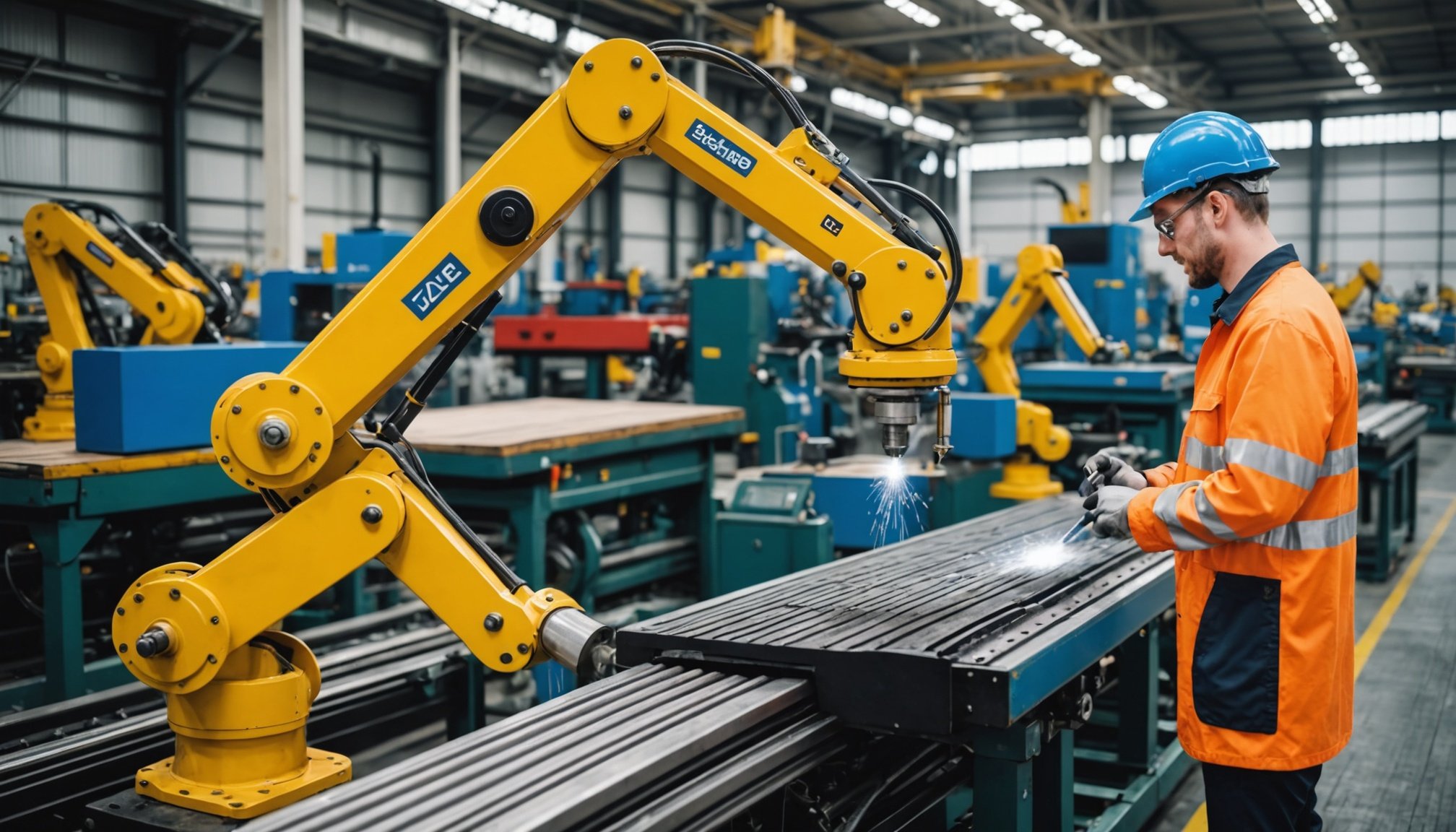The Impact of Machine Learning in Supply Chain Forecasting
Machine Learning is revolutionizing supply chain forecasting, particularly within UK Manufacturing. This cutting-edge technology is transforming how businesses predict demand, manage inventory, and optimise operations. Traditional methods, often based on historical data analysis, lack the adaptability and precision that machine learning offers. These conventional approaches struggle with large datasets and real-time data evaluation, while machine learning can handle them seamlessly.
The integration of machine learning in supply chain forecasting significantly improves accuracy and efficiency. Algorithms can rapidly process complex datasets, identifying patterns and trends that humans might miss. This capability not only refines demand forecasting but also aids in balancing supply with rapidly shifting consumer demands. Predictive insights from machine learning help manufacturers make informed decisions, reducing waste and enhancing operational efficiency.
Also read : Essential Tactics to Protect and Thrive Your UK FinTech Startup
Furthermore, machine learning outshines traditional forecasting methods by continuously learning and adapting to new data inputs. This adaptive nature enables more precise and dynamic forecasts, crucial in today’s fast-paced market environment. As UK manufacturing embraces these innovations, they set a new benchmark for supply chain efficiency, demonstrating the transformative power of machine learning. With its widespread adoption, businesses can maintain a competitive edge, ensuring supply chains are robust and future-ready.
Case Studies: Successful Implementations in UK Manufacturing
Exploring how companies in the UK have navigated the integration of machine learning into their supply chain processes offers valuable insights. Let’s delve into unique case studies illustrating these successes.
Also to read : Optimizing UK Health Apps for Senior Citizens: Top Strategies for Improved User Experience
Company A: Enhanced Forecasting through Machine Learning
Company A, a prominent player in UK Manufacturing, faced significant forecasting challenges. Initially, their demand predictions were inaccurate, leading to operational inefficiencies. By incorporating advanced machine learning tools, they streamlined their approach to forecasting. Utilizing data-driven models allowed them to detect patterns unseen before. Consequently, the company achieved a 30% improvement in forecast accuracy. This enhancement translated into cost savings and better inventory management, showcasing the transformative effect of machine learning.
Company B: Streamlined Supply Chain Management
In a highly competitive industry, Company B employed specific machine learning techniques to refine their supply chain. Algorithms assessed extensive datasets, enabling real-time adjustments in logistics and procurement. This move enhanced their operational efficiency by 25%, minimizing delays and optimizing inventory levels. The measurable improvements underscored the importance of embracing such technology in modern supply chains.
Company C: Meeting Consumer Demand Responsively
Company C, struggling with dynamic consumer patterns, harnessed machine learning to predict and meet customer demands efficiently. By employing adaptive algorithms, they maintained responsiveness to market changes, boosting customer satisfaction metrics by 40%. These metrics demonstrate how machine learning successfully anticipates consumer expectations, driving competitive advantage.
Challenges in Adopting Machine Learning for Supply Chain
Integrating machine learning into supply chain processes is not without challenges. Many UK manufacturers encounter obstacles due to data quality and availability. Machine learning models rely heavily on vast amounts of accurate data to operate effectively. Inadequate or inconsistent data can severely impact the accuracy of forecasts and predictions. Additionally, manufacturers must contend with data silos, where crucial information is stored in isolated systems, hindering seamless data flow.
Moreover, organisational resistance can pose a significant challenge. Implementing machine learning demands a shift in company culture and often faces hesitation from employees accustomed to traditional methods. As such, change management strategies become essential. These strategies include engaging leadership buy-in and fostering a culture supportive of innovation and adaptation.
Another hurdle is the need for skilled personnel capable of managing and interpreting machine learning applications. Companies may need to invest in training to build these competencies internally or seek external expertise. Overcoming these obstacles is crucial for successfully harnessing the benefits of machine learning, ensuring improved efficiency and accuracy in supply chain forecasting. By addressing these challenges head-on, manufacturers can pave the way for seamless technology integration.
Future Trends in Machine Learning and Supply Chain Forecasting
Exploring emerging trends in machine learning offers insight into future developments in supply chain forecasting. Real-time data integration is becoming fundamental, allowing manufacturers to respond promptly to changes. Predictive analytics plays a pivotal role here, leveraging vast datasets to forecast demand patterns accurately.
The potential for machine learning to revolutionise UK manufacturing is immense. Innovations like autonomous decision-making systems and enhanced predictive analytics are set to redefine industry standards. In the next decade, these technologies are expected to drive more intelligent, resilient supply chains.
Key advancements include adaptive learning models that evolve with new data inputs. As UK manufacturers adopt these tech-savvy solutions, they can expect more robust supply chains capable of withstanding market fluctuations. This adaptability ensures businesses remain competitive, maintaining efficiency even amidst unpredictability.
Predictions indicate that machine learning will continue reshaping the landscape of supply chain management by promoting automation and precision. Incorporating machine learning-driven insights will not only streamline processes but also foster innovation and sustainability. Staying abreast of these trends ensures manufacturers harness cutting-edge technologies to gain a competitive edge, future-proofing their operations for the challenges ahead.
Supporting Data and Research in the Field
Examining supporting data and rigorous research is essential for understanding the impact of machine learning on supply chain optimization. Numerous studies have highlighted the effectiveness of this technology in improving forecasting accuracy and operational efficiency. For instance, research indicates that machine learning-driven approaches can reduce forecasting errors by up to 40%, showcasing a substantial advantage over traditional methods.
Key Performance Metrics
Industry benchmarks provide valuable insights into how machine learning enhances supply chains. Key performance metrics, such as inventory turnover and demand forecast accuracy, are commonly used to gauge the success of machine learning integrations. These metrics not only evaluate efficiency but also highlight areas for further improvement and innovation.
Recommendations for Strategic Data Use
Manufacturers seeking to bolster their strategies with research data should prioritize acquiring datasets that offer comprehensive insights into consumer patterns and demand fluctuations. This involves:
- Collaborating with research institutions to understand industry trends.
- Utilizing machine learning analysis to process and interpret vast volumes of data.
- Incorporating benchmark studies to validate strategic decisions and enhance competitive positioning.
By grounding their operations in sound data and analysis, UK manufacturers can ensure strategic alignment and harness cutting-edge technologies effectively.
Actionable Strategies for Implementing Machine Learning
Integrating machine learning requires strategic planning to harness its full potential in supply chains. Here, we explore actionable strategies to ensure successful implementation.
Creating a Data-Driven Culture
Building a data-driven culture is fundamental to leveraging machine learning. Leadership buy-in is critical; it sets the tone for embracing technological advancements across the organisation. Engaging employees and fostering data literacy ensure that team members understand and align themselves with new tools and processes. Training programs and workshops can bridge the gap, enabling personnel to adapt to data-centric roles.
Choosing the Right Tools and Technologies
Selecting appropriate tools is pivotal for deploying machine learning in manufacturing. It involves assessing platforms like TensorFlow and IBM Watson, known for their robustness in handling large datasets. Manufacturers should weigh factors such as ease of integration with existing systems, scalability, and support services. Tailoring choice to specific supply chain requirements ensures seamless technology adoption.
Continuous Monitoring and Improvement
Ongoing assessment is vital to maintaining machine learning effectiveness. Implementing iterative processes and establishing feedback loops help refine models over time, ensuring forecasts remain accurate and relevant. Developing key performance indicators—such as forecast accuracy and inventory turnover—provides measurable insights, guiding continuous improvement and aligning strategies.





